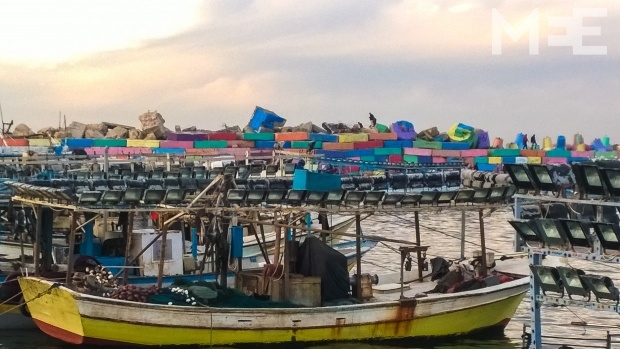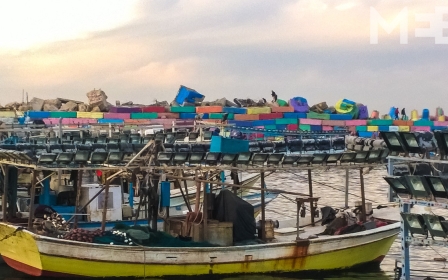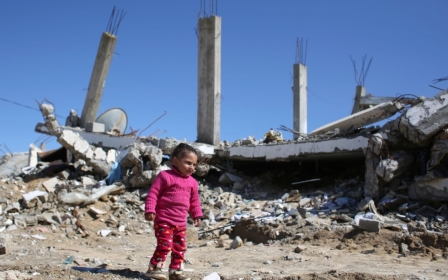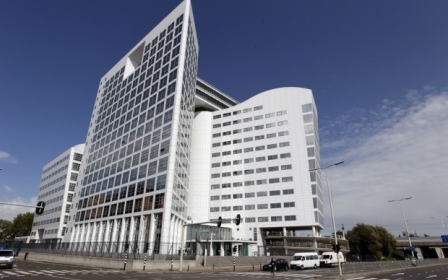Dear Federica Mogherini: Please endorse a ferry to life

With an axe in both hands and rage tightening every muscle in his face, the Palestinian physician started hacking at Rafah gate, popularly known by Gazans as Rafah hate. His Russian wife hugged her screaming dehydrated children close, trying to calm them down and simultaneously attempting to grasp and process the humiliation that her husband was experiencing at the very place he had yearned for, for years. The dream of bringing his children to see their grandparents and glimpse his homeland had morphed into a nightmare. Every sweet moment spent in Gaza was now evaporating. On the brink of a disaster, terrified of losing everything he had achieved in long years of painstaking work, he was making a half-crazed, desperate, valiant attempt to change his destiny with his own two hands.
Some of the other people stuck there at Rafah gate into Egypt were meanwhile making vain efforts to placate and restrain the doctor. He and his family had planned a three-week visit but had ended up stranded indefinitely in the open-air prison of Gaza with no prospects of leaving. They had already missed their return flight from Cairo, his wife had lost her job in Russia, and his place of work had already sent him final notice before letting him go.
No way out
Heightening their terror of total financial doom, they had just bought a home and committed to a mortgage. The doctor had applied for a permit to leave via Israel, through the Erez crossing, but as Gazans know, getting such a permit is no less than a miracle. For weeks, he and his small family had been suspended in powerless, unnerving uncertainty. I believe that not one of us, the rest of the people stranded and waiting at Rafah that day, will ever be able to forget the terrible scene. Many were crying, men included. (I can testify firmly to the fact that men, many of them, do cry.)
I don’t know what happened to the doctor and his family after this incident. I probably never will. But the sustained uncertainty entrapping this family is a basic fact of life for all Gazans today. Notably, on the occasion of International Women’s Day, women are often the ones bearing the most long-term burdens of such an existence. A recent report detailed gender-specific forms of violence suffered by women in the occupied territories, which for instance include imperative breadwinning for extended families after the killing or imprisonment of men with little or no support from a social security system.
Today, 18 months after the doctor’s act of desperation, the situation in Gaza is no different. Indeed, it is even worse. Getting out of the Gaza ghetto remains a miraculous feat. In fact, Palestinians in the Strip need multiple miracles simply to practice normal life. Following the July 2013 coup that ousted Egyptian president Mohamed Morsi, Rafah crossing has been almost completely sealed. On 25 October 2014, the crossing was declared closed - indefinitely.
Denial of fundamental rights
Since then, the blockade on Gaza has been even tighter than before. 1.8 million people have been sentenced to a form of isolated confinement, which has little or nothing to do with the security of Israel and everything to do with subjugation and humiliation. Nine years of Gaza’s forceful closure have already imposed severe restrictions on the movement of people and goods, and denied an entire community its most basic and fundamental rights, while repeatedly obstructing its sustainable recovery from destruction and devastation. The blockade amounts to collective punishment, which is a violation of international law.
Just this last summer, Israel carried out 51 days of horrendous military aggression against Gaza. The Rafah gate was sealed throughout most of the “operation,” with the exception of a few sporadic and unpredictable days. This denied Gazans viable access to vital humanitarian aid and demonstrated the depth and severity of the blockade’s effects on the life and death of every single person in Gaza. The urgency and gravity of the situation before, during and - perhaps more significantly – after these weeks of Israeli aggression, cast a dim light on the role, or rather the absence, of the UN and of regional and international governments in ensuring Palestinians’ most basic right to life.
Reneging on movement pledge
The barely describable circumstances of the Gazans under siege and attack emphasised the total impotence of supposed international powers in holding Israel to one of the clear terms of the agreement it signed with Hamas in Cairo in 2012, a term which it never implemented. The parties to that agreement committed to: "Opening the crossings and facilitating the movement of people and transfer of goods and refraining from restricting residents' free movements." Attaining a ceasefire on these terms, however, Israel reneged on its pledge to facilitate freedom of movement. From November 2012 through June 2014 it enjoyed security and freedom, meanwhile maintaining the blockade and keeping Gaza cut off from the world.
Following yet another ceasefire on 26 August 2014, the grim humanitarian situation in Gaza has deteriorated horrendously. Israel insists on keeping in place measures that Sarah Whitsonof Human Rights Watch has described as unjustified restrictions “needlessly punishing civilians.” The prospective donors assembled at the October 2014 Cairo conference on rehabilitating Gaza have followed suit and reneged on commitments.
Given the utter failure of official American diplomacy and the repeated Israeli attacks on besieged Gaza, many wonder what can be done to alleviate the suffering of Gazans who are currently sandwiched between the Israeli blockade on one side and the effects of the military coup in Egypt on the other. There is little hope that the tension in the Sinai, which is always Egypt's justification to close Rafah, will be resolved soon. Similarly, and despite several calls, there is no sign that Israel will ease the blockade willingly. A fresh initiative is urgently needed - one that gets around Israeli excuses for maintaining the blockade and provides Gazans with a glimpse of hope.
A ferry to Cyprus
A commercial ferry service to Cyprus seems to be the answer. It is an initiative that could be put into place relatively quickly. It is doable, possible, and innovative - a solution that could be implemented were there a political will. True, there is no magic way to overcome the Palestinian plight, but certain actors such as the EU could provide a simple humanitarian remedy that would make a genuine difference in the lives of besieged Gazans. Perhaps a highly respected figure such as EU High Representative for Foreign Affairs and Security Policy Federica Mogherini, who is widely admired by Palestinians in Gaza, could take the initiative.
There are plenty of suitable ferry operators in the Mediterranean who could provide a normal commercial service. Cyprus is about 400 kilometres from Gaza. This is almost the overland distance between the Rafah crossing and Cairo. A ferry could make this journey in 12 hours. A Palestinian needs almost a day to reach Cairo when the Rafah crossing is not closed. A ferry would initially be only for passengers but eventually it could carry goods as well. It would run on a regular timetable two or three times a week.
Unlike other projects, money would not be an issue. A ferry service would be good business for Cyprus and provide hope for besieged Gaza. When fees, transportation costs and stamps are taken into consideration, a Palestinian must pay at least $150-200 to reach Cairo via Rafah. A ferry that carried 500 passengers (500 people normally use the Rafah crossing daily when it is open) would make a good profit. Desperate Palestinians would be ready to pay double or triple for a ticket provided they could move. Even if each passenger were to pay the regular $200 for a one-way journey, the ferry would gross a $100,000 a day. Once Palestinians were in Cyprus they could make their way to any place in the world.
It is true that the Israeli navy is maintaining a sea blockade of Gaza and all of Europe is concerned about illegal immigrants. If, however, the EU were in charge, it could guarantee for both countries that only people with the right papers would be on the ferry and that it would be loaded with no prohibited items. This humanitarian initiative is possible, and it could have all the guarantees needed by all parties, including Israel as the occupying power.
Dear Federica Mogherini,
On the eve of International Women’s Day, as women the world over stand against subjugation, I implore you to endorse this initiative. It can directly save the lives and livelihoods of countless women and families in Gaza. It can leapfrog, creatively, over the current deadlock and nurture hope when millions in Gaza are bereft of even the right to hope. Pondering the future with fresh imaginative eyes, the normalising effects of a commercial ferry service can pose a real challenge to stalemate and entrapment; to the closed gateways of Rafah and Erez, to the cycle of ceasefire and attack, to recurring, unending destruction and rebuilding. Based, as it is, on strictly human and humanitarian considerations, it circumvents the political obstacle of implied EU recognition of Gaza’s elected government.
I have witnessed the untimely death of my own father and watched one of my cousins die of medical conditions which were treatable or even curable - beyond the borders of Gaza. Both of them died awaiting a bureaucratic miracle - a travel permit. I have relived this experience repeatedly, watching the deteriorating health of numerous relatives and friends as they await a precious piece of paper. Please, support a practical means of ending this inhumanity. Many have died already. But many others can still be saved. A human, humanitarian, commercialised ferry service can open up so much more than the sealed gates of Gaza.
- Ghada Ageel is a visiting professor at the University of Alberta Political Science Department (Edmonton, Canada), an independent scholar, and active in the Faculty4Palestine-Alberta. Her new book “Apartheid in Palestine: Hard Laws and harder experiences” is forthcoming with the University of Alberta Press - Canada.
The views expressed in this article belong to the author and do not necessarily reflect the editorial policy of Middle East Eye.
Photo: Israel has excersised full control of Gaza's territorial waters since 1967 (MEE/Creede Newton)
New MEE newsletter: Jerusalem Dispatch
Sign up to get the latest insights and analysis on Israel-Palestine, alongside Turkey Unpacked and other MEE newsletters
Middle East Eye delivers independent and unrivalled coverage and analysis of the Middle East, North Africa and beyond. To learn more about republishing this content and the associated fees, please fill out this form. More about MEE can be found here.





